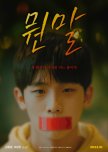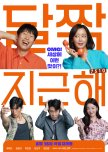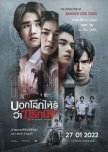
Yikes!
What a terrible plot. The FL apparently needs to change everything about herself and become ultra skinny, with no work on her part btw, for the ML to be interested. He was a crap ML, so I'm not sure why the FL should want to be with him in the first place. Move on to someone who's actually good. Also, if you want to change your body and be skinnier, you should do it for yourself, your health, and mental health (if it bothers you that much). And if you choose to do that, it will take a lot of work. Surgeries will not solve it for you and won't keep it solved either. Such a horrible message!Was this review helpful to you?

When I say cute movie, its underestimating the movie
When you feel like there isn't a good romance movie, this movie shines like no other. Out of the rom-com fests, or sad girl romance drama fests, and unhappy, heart-wrecking, mind-crying, "realistic" love stories, this is a true gem.It isn't special. It's got no special script or actors. It got nothing out of the ordinary but then again what is ordinary? In Drama Land, we have so many stereotypes and cliches that this movie with its not-so-much simpleness happens to be perfectly fit into what seems like pure bliss.
We have a simple ML and witch. it isn't love at first sight but it sure does feel like it. With his simple ways, the stupid and unwavering ML does whatever he can to win the FL. It's not a special love story but it sure hits your jellies.
(We all love a quirky and dumb ML whose dumb ways just exist in our hearts.)
I don't know if its the setting or the entire vibe check of the movie, but it's nice and wonderful to sit and watch.
Def rewatch material!!
Was this review helpful to you?

Too bad the storytelling around the stakes and the editing hindered my enjoyement
I was quite disappointed by this action movie. More specifically because the most interesting aspect of the plot (with the submarine scenes, all involving a deep and gutwrenching psychological aspect) is only coming up past the 2/3 of the movie. I'm left to wonder if I would not have appreciated much more the film if it had been edited in another way around rather than creating a false suspense regarding the identity of the antagonist.The performance of the casting was overall good but not stellar. At the end, surprisingly enough, it is two of the guest roles (played by Cha Eun Woo and Lee Min Ki) that grabbed the most my attention. I wish that Lee Jong Suk would have been given a bit more room to shine and do more in terms of dialog as well as characterization. Once again, maybe a different edit of the story would have allowed to have much more powerful stakes for the story.
Regarding the production value, it was pretty good. There are some rather thrilling action sequences and good ideas in terms of directing. There are a lof of variety in the dangerous situations faced by the main protagonists. The soundtrack is quite absent from the movie, not that memorable but there is a pretty sorrowful song that I enjoyed during the ending generic.
I would not necessarily recommend this to people as I did not particularily enjoyed my watch. My main issue with the film is coming from the scenario and the way the story is building up the characters. I did not manage to engage with the main roles and in an action movie, rooting for the good guys and understanding from where they are coming from is critical to really get me invested and care about the story. Here, I started to care much too late and felt that the 2/3 of the movie was not as exciting as I would have wished.
Was this review helpful to you?

This review may contain spoilers
How much and in what way will our own decisions and those of others affect us?
One of the most complex and uncomfortable topics in human relationships is infidelity, but our worst qualities, decisions and actions are a great tool for cinema, which can turn even the most twisted relationship into an emotional, deep, complex story. and explosive, which divides opinions and leads us to explore what we do not dare to see in ourselves.Infidelity is ugly and painful, and can be traumatic for many people, but it becomes interesting and arouses curiosity when it is a "tragedy of others", the kind that movies show us, and it is also a good way to learn about more about the subject, the reasons that lead us to betray our partner and the way we deal with all that.
'Spring Like a Lover', by director, screenwriter and editor Daisuke Shigaya, is a 2017 Japanese film that proposes an unusual love triangle between three homosexual men whose lives fatefully intertwine.
Kazu (Konosuke Furuya) distrusts her current boyfriend, Shin (Tact Igarashi), a moody photographer, because she believes he is unfaithful. After an argument, Kazu revisits her ex-boyfriend, Takashi (Kazuki Kawakami), but discovers that he is now married to a woman and is unaware that this man is the one Shin has been having sex with behind his back. After the reunion, Takashi rekindles his feelings for the person who once shared his bed.
In this story about sex, betrayal, obsession and toxic relationships, the lives of these three men become complicated after the infidelity of one of them towards his partner. Of course, no one deliberately wants to harm others, but that is exactly what they end up doing.
One night, Takashi tries to have sex with Kazu, but Kazu immediately rejects him, not wanting to be involved in a relationship with a married man, and returns to Shin's house.
In Kazu's absence, Shin goes out to the terrace where her boyfriend has a beautiful caged songbird and deliberately tries to make the bird fly out of the cage. When he doesn't succeed, he leaves the door open.
In this short film that explores the universality of human emotions and poses a question: How much and in what way will our own decisions and those of others affect us? When reality breaks through, this complicated love triangle leads to tears, confrontations , breakups and violence.
After returning home, Kazu and Shin's reunion allows them to reconcile and strengthen their relationship. However, Takashi has not been able to forget Kazu, so he confesses to his wife about his sexuality, and she breaks up with him, but not before accusing him of betrayal for not having been honest with her.
Kazu is the most empathetic character of the three. Because he cares about Shin, he is able to activate a protective instinct in him. She loves her boyfriend, so she will seek to prevent him from suffering the consequences of her own actions and decisions, even if the price is high. He has seen how the photographer is heading towards a precipice and since there is nothing he can do to stop him, he appears frustrated and helpless. The image in the bathtub is, in addition to being heartbreaking, symbolic in this sense.
Shin is not a good man who messes up and makes a mistake. Both the script and the film are responsible for emphasizing that she is deliberately unfaithful to her boyfriend, and this fact will unleash all the subsequent conflicts. In addition, he violates people's privacy by taking photos of them in the streets without their consent, so he has to flee when he is caught in the act, because although in Japan it is not a criminal offense to photograph people's faces in public, it can be a crime. a civil offense if the person who has been photographed finds or fears that their image may be published anywhere.
On the other hand, Shin shows a cruel and violent face, not only for hitting Takashi, but for retaliating against Kazu in the bird for abandoning him and leaving the house. Even so, the strong emotional control she has over her boyfriend is evident.
Between arguments, crying, beatings, nude scenes and explicit sex, the 33-minute duration of the footage passes, which should not be analyzed, evaluated, labeled and classified as BL. There is a tendency among lovers of the so-called "Boys Love" to classify as such any love relationship between boys on the screen, and when they discover that the audiovisual shows a more complex dynamic, with characters with diverse nuances, circumstances and conflicts that surpass those of the genre of their preference, they accuse that this is not what they want to see, that they do not understand the film or television proposal, and they advise others not to see the artistic product, but not before giving low ratings on platforms where they are discussed. and analyze these dramatizations.
'Spring Like a Lover' is not a BL genre film, but an LGBT+ themed drama. The viewer should not expect to find here a tender and light romance between boys of those in which the audience is more interested in knowing the height of the step from which one of the protagonists will fall into the arms of the other to be happily ever after, in instead of living an experience closer to real life.
That is why 'Sprint Like a Lover' does not shy away from presenting damaged, broken, unfaithful, lying and miserable beings, as well as betrayal, infidelity, dysfunctional relationships, violence in the couple, breakups, pain. It does not shy away from showing romantic lives that are flawed and in complete anarchy.
If Shin's infidelity has an impact on the couple and on Takashi, the latter is the living reflection of human misery, selfishness, hypocrisy and limitless cruelty in demanding sex from Kazu in exchange for Shin's freedom, in addition to accept money from Kazu to drop the charges against her boyfriend.
The three men carry the entire weight of the film, without ignoring the brief presence of Takashi's wife, and are capable of transmitting emotions with gestures, silences, screams and looks in a performance as subtle as it is extraordinary, closing an intense, heartbreaking film. and very emotional.
The ending does not surprise fans of dramas that explore relationships with all their contradictions, conflicts and realities. Shin's infidelity causes his own ruin and that of the other two men.
"No one is an island, complete in himself," the poet John Donne wrote centuries ago. That is why Shin's actions influence both his own life and that of the other two characters, and end up affecting them directly. By being forced to assume the consequences of their own decisions and those of others, they see their worlds destabilized and condemned to a spiral of many other equally erroneous and destabilizing acts and decisions.
It is then that the viewer can understand the message of the film: the importance of becoming aware that every decision we make and every act we perform has natural and social consequences. We are all responsible for every decision we make and every act we perform, in such a way that we can say that our life is the result of our choices and not of circumstances. While it is true that circumstances influence our reality in life, it is also important to accept the fact that what is truly determining is the way in which we choose to react to each situation that is presented to us.
Perhaps somewhat underrated at the time, with the passage of time it has gained public understanding, but it must be seen because Daisuke Shigaya knew what he was doing with this film of rebellious and explosive emotions. We are rational beings, which adds one more element to the mere instinctive aspect that characterizes us. The fact of being rational beings implies that we can choose the way we react to the different circumstances in life, hence the statement that our life is the result of our decisions, not the circumstances.
Observation: MDL and other platforms make a mistake by labeling Tact Igarashi as Kazu. The character of Kazu is played by Konosuke Furuya, while Tact Igarashi plays Shinji Matsumoto or simply Shin, Kazu's photographer boyfriend. The character of Takashi is played by actor Kazuki Kawakami.
The director, screenwriter and editor of the film is Daisuke Shigaya.
Please, if someone could help verify and correct the error I would appreciate it. Thank you.
Was this review helpful to you?

A typical ‘the rise of the underdog’ sports movie, yet heartwarming and inspiring.
Rebound is based on the true story of Busan’s Jungang High School basketball team, which against all odds, managed to win the national championship with only six players.Like other sports movies, Rebound offers nothing new in terms of concept and storylines. This movie is not far from the idea of capturing the essence of the human spirit and maintaining the storyline about overcoming setbacks. Although people can predict how the story is going to be, it’s worth anticipating and worth watching.
The cinematography effectively conveys the values of sportsmanship, teamwork, and fighting spirit. One strong point of this movie, in my opinion, is the realistic and convincing portrayal of the players. Each character manages to carry the story efficiently, even though some characters don’t have a prominent backstory. The combination of good character development, well-developed plotlines, and a positive message makes this movie a heartwarming and inspiring piece to watch. It’s an uplifting story of hope, dreams, and resilience.
Was this review helpful to you?

"A man is not a human being without mercy"
Sansho the Bailiff had little to do with the title character and everything to do with two noble children sold into slavery to him. A family torn apart never let the dream die of being reunited one day. They would all have to decide if they should continue doing the right thing when good things happened to bad people and bad things happened to good people.A governor who refuses to let the military conscript and further tax his people who have experienced famine for 13 years is stripped of his title and exiled. Before he leaves, he tells his son to remember that “A man is not a human being without mercy…Everyone is entitled to their happiness.” He gives Zushio the treasured family statuette of Kannon, the Goddess of Mercy to keep with him. His wife Tamaki and the two young children stay for a time with her brother and then determine to make the long trek in search of the father. Along the way they are betrayed in an area rife with bandits and slave dealers. Tamaki is sold into prostitution on a distant island and the children are sold into slavery to Sansho the Bailiff. Sansho is a cruel slave owner who keeps his slaves in a walled compound. Any attempt at escape results in a branding on the forehead. Sansho’s son, Taro, is kind to the children and tells them to endure until they are old enough to escape and make the difficult journey to their father. He then leaves the compound, never to return. As the children age, Anju adheres to her father’s words of wisdom while Zushio abandons them and in a twist of fate becomes the cruel "son" Taro could never be.
Calling out injustice was a familiar theme for Mizoguchi. In this film, the barbarism of forced labor camps was brought forth. More than once, the suffering of the common people was dismissed as unimportant by the affluent leaders. Much as his sister in real life had been, Tamaki was sold into prostitution. Despite the longing and despair of the characters, the scenery was amazing. Cinematographer Miyagawa Kazuo brought great beauty to the black and white film with stunning outdoor shots. Mizoguchi used water in several scenes—a lake and the ocean providing two of the more powerful moments in the film. Sansho’s slave encampment was claustrophobic and filthy, dark with hopelessness hanging over the weary people.
Sansho the Bailiff was based on a 1915 short story which was based on an old folk tale. What is curious about the title of the film was that Sansho was the villain and appeared far less than Zushio and Anju who were sold into slavery to him. Instead of Sansho’s story this was the boy Zushio’s as he grew into manhood. The mother and children were given different names along their journeys of suffering and as they sought to hold onto and rediscover their identities. Zushio’s growth and quest to reunite his family was the narrative backbone to the film. And if his growth was the backbone, Anju’s and Tamaki’s loving persistence was the life-giving blood of the film. Both women had deeply poignant scenes that will linger in my mind. Anju had a devastating scene that far from being melodramatic was like ripples through time that would affect other characters’ lives. And like those ripples the good done by the family members spread ever outward even when the family paid the cost. Sansho the Bailiff juxtaposed man’s cruelty and ability to be merciful, an ongoing battle even now as humankind decides who they want to be when they grow up.
15 April 2024
Was this review helpful to you?

A one-sided love of a boy for a boy
Dong Young (Kim Dong Young) has been secretly in love with Jung Min (Lee Jung Min), his best friend, since he met him 10 years ago, and he has come up with an idea to finally declare his love.Romantic dramas, no matter how short in duration, achieve immortality when in a single scene they manage to convey the spirit of the central bond.
'What To Say' (뭔말 Mwonmal), by South Korean filmmaker Kang I Deun, has a sequence of overwhelming subtlety, in which we witness how a young man assures his best friend that he will make a film, and to the astonishment of This will reveal the scenario written in the script to be captured in moving images, which is none other than the same story of the friendly relationship that has existed between the two friends and how the main protagonist of the film to be produced would like to carry that bond on another level, even knowing that it is "a cliché story where Woo Joo's first love (the name he gives himself in the future film) ends unsuccessfully."
With a precise, contained and melancholic narrative, Dong Young will know the answer, which will leave him devastated by heartbreak.
I am not issuing a spoiler: the same trailer for the short film on the AYDENSTORY channel assumes that we are in the presence of a unilateral love of a boy for a boy, and how this secret love follows them until one declares, with subtlety, naivety and creativity, their feelings for the other.
That statement highlights the purest love that Dong Young feels for this man who will never want (or be able) to live up to such a naive and immaculate confession.
The main reason why I recommend the film and give it a perfect score is that the director conceived flesh and blood, complex and human characters, who go beyond stereotypes. In this way, the young man who resorts to fantastic narrative to declare his feelings is not superficial by any means: he is simply a man who fell in love with another man. Following this line, the character played by Kim Dong Young is endearing because he has finally had the courage to take that step that has cost him a large part of his existence, although this presupposes the risk of not only losing the love of his life but also to the childhood friend.
The director himself has stated that the objective of the film is to expose "the long hesitations and great worries, brief confessions and small consolations. I hope that all the universes of this world are happy."
Was this review helpful to you?

In the things that pass, for those that stay
Kim Dong Ah is a teenager who seems to have been born frozen in the cold winter, and becomes obsessed with things that have not changed and are static, as if frozen, after his parents' divorce. His mother's love, which he thought would last forever, changed, and that change had a great impact not only on Dong Ah's family but also on his own life. With his mother gone, his father, wounded, became violent.In order not to hurt himself and to avoid hurting others, Dong Ah thought that it was best not to change and not let anyone into his life, for fear that one day this person would decide, like his mother, to abandon him.
With his large round eyes, poorly defined face and dark, bushy eyebrows, he has a deep voice and a dry expression and humor. He has had to leave school.
But suddenly, Song Yeon Woo comes into his life, a young man, also 18 years old, with a very warm character, who finds it natural to smile and is friendly towards others. Yeon Woo always approaches Dong Ah with a smile, and little by little he breaks the wall of sadness and coldness that he has built around him. Who is this person who seems to show everything about himself without hiding anything, but whose true feelings Dong Ah is unaware of? How is it possible that this boy, so different from him and as warm as spring, can make him feel unknown emotions? Is Yeon Woo a figment of Dong Ah's imagination?
With this interesting and intensely powerful story, Kim Yeo-rim, the writer and director of the short film 'The Winter Child', exposes how people, emotions and relationships pass over time. Time melts the frozen and freezes the melted. But there are things that human beings need to hold on to so that they do not escape.
In the director's own words, the film sends a message of comfort to those who are suffering in the midst of numerous changes, to those who hold on to something that may be painful: it is okay to let go and move on. It is necessary that painful things pass by, so that those that give us happiness and warmth remain forever, like the fire at the end of the short, in contrast to the ice/winter motifs that are maintained in most of the audiovisual.
Starring Hyun Woo Ahn and Woo Joo Hwang in the leading roles, and the cinematography by Gyu-ri Lee and Park Jeong-hyeon, the short film captivates the viewer.
'The Winter Child' seems to generate a lot of opinions among contributors to this forum. Of course, this is a film in which there is no promise of a vision of gay life, as most viewers expect when reading the labels "Gay Male Lead" and then "LGBT+." The film takes an introspective view of the soul of a young man. The movie has a way of staying with us even when it's over.
Kim Yeo-rim makes Dong Ah one of the most complex characters in recent films. This is a young man who is difficult to understand on a simple level.
The image of Yeon Woo melting Dong Ah's icy exterior and her ironclad belief that she can't change anything in her life will haunt me forever. Yeon Woo is the person who comes into his life to help him come out of his shell.
However, the ending may leave many viewers with more questions than answers: Is returning to the same beginning a good change? Is it preferable to stay in one place or seek changes that allow us to free ourselves from what causes us pain? Or instead, is it preferable to change by killing your previous self? Could Yeon Woo be a figment of Dong Ah's imagination? Could it be your inner voice that refuses to remain still, unchanging, unchanged?
Although 'The Winter Child' will divide opinions, the film deserves to be seen due to the complexity and care that the director puts into the story, and the excellent performances of its protagonists.
Was this review helpful to you?

Painted Skin: The Guo Jingming Edition
1 people found this review helpful
Short fantasy movie super impactful, left me with a deep lasting impression
This movie is apparently a shorter new take (with a gender swap) of the original movie which I have not seen. I'm truly impressed at how in only 31 minutes this movie managed to convey a super compelling story. I loved the fantasy aspect of it, it is very well exploited with a strong narrative. I found the overall scenario properly gut-wrenching with an interesting and rather grey morale.There are only 4 actors in this movie and their performances are pretty good: especially for Ding Cheng Xin, who has maybe the most room for range for acting and is very convincing in his role.
I enjoyed the music as well as the production value. It does not feel cheap. The special effect and make-up are far from perfect and could have been scarier but overall I found it adequate.
I would recommend this to people looking for a short wuxia / fantasy movie. Given the way it manages to convey so much in so little time, it is totally worth taking the time giving a shot to this gut-wrenching tale. The story is so interesting and has so much potential that I cannot help feeling greedy and to wish that it would have been a full length duration movie.
Was this review helpful to you?

An unusual love triangle
Sukitomo (I Like Tomo – スキトモ), the LGBT+-themed romantic drama and shounen-ai film by Japanese filmmaker Mitshuhiro Mihara, portrays that confusing time of youth in which relationships become imprecise and the balance between love becomes precarious. , friendship and family are broken.The film, from 2007, proposes an unusual love triangle between the serious and responsible young man Aoi Tomokazu, a member of a boxing team and who is in his third year of university, Yoshiko Saitō, his best friend and two years younger, whom he sees as a little brother - although he feels something more for him than a simple friendship - and Tomokazu's sister, Aoi Misao (Komatsu Airi), who is also romantically attracted to Tomokazu and is jealous of his relationship with Yoshiki.
After his performance in 'Boys Love', of the same film genre, Takumi Saitō, star of the 'Prince of Tennis' musicals, now in the role of Aoi Tomokazu, continues in this film challenging perceptions of love, friendship and the sexuality. As in 'Boys Love', Saito acts alongside Aiba Hiroki, one of the co-stars of 'Prince of Tennis', the latter playing Yoshiko Saitō.
Released on January 13, 2007, the film was screened for the first time at the 16th Rainbow Reel Tokyo, an LGBT-themed film festival held annually in the Japanese capital, 'Sukimoto' tells us the evolution of relationship, from childhood to early youth, between the future boxer and the boy Yoshiki, who was hit by a truck while playing with Tomokazu and suffered an injury to his right leg.
This injury never fully heals and consequently he limps when he walks, a fact for which he believes Tomokazu feels guilty and treats him well for it. Yoshiki must deal not only with Misao's attempts to keep him away from his brother, but also with his own conflicting feelings.
The role played by Takumi Saitō is coherent in embodying the role of the young man so busy in boxing that he has not realized the attraction that Yoshiki and Misao feel towards him. I like his performance in this movie. I've seen some of his other work, but I really admire his art after watching 'Sukimoto'.
Hiroki Aiba also achieves naturalness playing the disabled friend in love with his best friend and neighbor, and Airi Komatsu as the 14-year-old sister who is jealous of her brother's relationship with Yoshiki, since she also has loving feelings for him.
Also convincing is the performance of Mizuki Tsuruoka in the role of Arisa Andō, Misao's best friend, who, despite her young age, has been able to understand not only Misao's loving attraction towards her brother, something she considers unhealthy, but also Yoshiki's love for Tomokazu.
The title of the film, which addresses themes such as friendship, love, family and fraternal relationships, is a play on words; «suki» (スキ), which translated from the Japanese language means "to like", and «tomo» (トモ), which refers to the name of the main character. Therefore, the name of the work could be literally translated as "I like Tomo."
With the production of Kawashiro Kazumi and Kataoka Masahiro, the director called on the award-winning Japanese photographer and director of photography Ashizawa Akiko to translate the script written by Kanasugi Hiroko into images.
Was this review helpful to you?

This review may contain spoilers
Love can come at any time in our life
I watched this movie to detox myself a bit from a disappointing drama I ‘ve been watching in the past few days, also recommended by another MDL user, what can I say, really a happy breath of fresh air...It's a really pleasantly well-made romantic comedy that, without saying anything new, joyfully succeeds in engaging the well-prepared viewer for its two-hour duration (which is not particularly heavy at all, however).
It is in the choice of the main players that the movie's success is most evident; telling a love story with two mature characters, wonderfully mature I would say, but at the same time still young in their hearts and at the end of the day simply desperate to have someone at their side to love, like all of us...
The story is of disarming simplicity and the plot mechanics are those well established in the classic Korean rom-com: the main character, with his hilarious facial expressions, lost in his foibles and fixations, with an absolutely absurd and decidedly unhealthy job, the usual circle of colleagues/acquaintances more deranged than him, as well as the bothering element of his brother; on the other side, our beautiful Kim Hee Sun, a messed-up single mother with a teenage daughter, obviously problematic...
Rather than the usual clash-meeting between two completely antithetical entities, the most interesting element is surely the lengthy courteousness on her part, which allows the staging of several rather amusing scenes related to the total clumsiness of our male subject
But it is precisely in these phases of rapprochement of the two lonely souls, in this gradual process towards a state of happiness, that I found myself most satisfied, in that desire to attempt to experience the same joyfully adolescent emotions that can be found in so many dramas or movies, more or less good; that attempt at normality that leads us to think: "Why can't we experience the same joys too!"
Of course, there are the obvious lucky coincidences and even several innocent ingenuities that push the story towards the most obvious ending, thanks also to a supporting cast that is functional to its role, but in the end you are immediately inclined to cheer for the two heroes and therefore we welcome that bit of magical coincidence that leads to the happy end, just to have a Romantic Heart and believe/hope that love can come at any time in our life
The rating is a perhaps generous 7.5/10, but in cases like this it is OK to be kind...
Was this review helpful to you?

I wish this was a series instead
Tell The World I Love You tells a story about the latchkey youth of Bangkok, featuring a narrative littered with drugs, violence and endless cycles of revenge.The film has no intimacy scenes. But somehow, it still manages to be rather romantic. It tells a story of various characters, each coping with their own loneliness and finding a reason to live (and die) because of other people.
I love that much of the film is drenched in a moody aesthetic, serving as a constant visual reminder of the characters’ loneliness. I wish this was a series instead so that they could spend more time fleshing out the story and the difficult/ambiguous life choices made by individuals.
Although expressed in different ways, “escape” is a recurring theme for these teenagers.
When Keng realises he’s eligible to apply for a scholarship to go to China, life is imbued with new meaning as another life path opens up for him.
The irony of Tai's love is that as he helps Keng escape his current circumstances, he finds himself trapped instead.
And for Boang, whose only family member is his grandmother, he has lived an aimlessly bleak life until Keng showed up. Keng might just be his way out.
Full review: https://asianblreviews.wordpress.com/2024/04/15/tell-the-world-i-love-you-2022-movie/
Was this review helpful to you?

The horror was okay. There was a decent number of jump scares and there was only one that fazed me because of the fast cut, like I twitch my head back a little. I watched this in 2x by the way.
The acting is good, but it could've been better, like as the mom was slowly getting cuckoo in the head they could've added some makeup to her face to show that she's really getting depressed.
The Music was okay. It did its job to elevate the horror vibes.
Was this review helpful to you?

A Very Great Movie
I waited for this and Thank god it delivered. The moment I saw this uploaded on *cough* sketchy sites *cough*. I immediately stopped everything that I was doing and sat down to watch it.The story is predictable and formulaic, but hold on! Let me explain. I don't really read the synopsis. None at all. I like going in blind whenever I watch something and just let the story do its job. Now, what I mean by "predictable and formulaic" is that the way the story is structured already follows a blueprint that I'm familiar with because when I watched it just 5-10 minutes in, I was like "Ahh, so the movie is gonna about the struggles and the challenges that they have to face, like this and that" just from how they are speed running the build-up on how they become a couple in the beginning. And I didn't mind that just because I've seen it being similarly done before a thousand times doesn't mean I'm not going to enjoy it. I still kept watching because I was curious how they gonna do it. Even though I already called it what the movie is going to be about, I was still wrong when it came to the story beats because how they did it is pretty unpredictable. I even cried at some scenes for how impactful it was.
When it comes to the characters, I felt the same. It's heavily focused on the main couple. They're readable, but I love their chemistry. Even though the movie doesn't tell, it is more about just showing you what it can do. And that's how you know that the actors did a great job of conveying the thoughts and emotions of the characters through their acting. I was so engrossed by the character writing that my attention is sucked in and the main couple are Writer and Artist, basically my 2 aspirations. Also, oh my god!!! Zhang Jing Yi's hair😭😭😭 The stylist has to go to jail for that!!! Thank god it got fixed after the time skip. ML is handsome and cute, I wish they'd added some extra details to his illness to make it more relatable and scary.
While watching this, I kept pausing every time just to commentate and analyze what just happened, as if I had someone beside me, I might as well have made a reaction video at that point and posted it online.
Overall, a very great movie, despite the story structure being familiar to me. I highly recommend it.
Was this review helpful to you?

This review may contain spoilers
A small student work with immense power
The first thing that catches the viewer's attention is seeing a boy in a school uniform shaving his head with a cut that is too deep, almost releasing blood, while crying inconsolably. This is what Juan Pablo Pineda III, the director and screenwriter of the LGBT+-themed romantic short film 'Coming Out' (Pua Iyam, for its title in Tagalog), wanted to convey, since it is the true essence of the film.Ken, a Chinese-Filipino teenager, has known his true identity for a long time, but has not dared to reveal it out of fear. However, reading a book titled "Pua Iyam" gives him the courage to confess his love to Miko, his best friend since childhood.
Going back to my opening words and the first scene of the film, Ken cries and shaves his head because he has been rejected. And Miko, although she also loves Ken, knows that her family and society will not understand them and "I am not prepared to admit what I am", referring, of course, to his homosexual condition.
If I say this it is not to issue spoilers, but to express in words what the short film subtly lets us see: the fear that the two boys suffer of discrimination and rejection by society due to their sexual orientation, which is why They feel insecure about their identity and avoid revealing it to others and to themselves. They prefer to suffer and make the person they love suffer before recognizing and loving themselves.
The objective of the short is to make a complaint against homophobia, that is, the aversion towards homosexuality or against homosexual people, and its eternal companion, internalized homophobia.
In the final scene, while Ken and Miko are playing after reconciling as friends, they both stare at the camera. Could this be a sign of hope? Will Philippine society ever come to respect all its members equally, regardless of their gender identity or sexual orientation?
Starring Rowi Du as Ken (who also produces, edits and sounds) and Raphael Cruz as Miko, the film had its world premiere at the Far Eastern University (FEU) SinePiyu Film Festival - Manila, in which it won the Awards for Best Film, Best Performance for Du, Best Direction and Best Poster in the Black Reel category.
The film follows his journey through different Philippine film events, such as the 7th. CineSB: Indie Un-Film Festival of the University De LaSalle College of Saint Benilde, in Manila, and the University of the Philippines-Diliman, and wins in the categories Best Direction for Pineda and the Gold Award for Best Film for the team of production by IndieGo Pictures, and the Awards for Best Production Design and Technical Excellence in the Sibol Category of CineSB 7: The Main Installation of DLS-CSB.
The film takes home the award for Best Cinematography and another special mention from UP Cinema's Piling Obrang Vidyo jury's decision, and obtained the Cardenal Bronze Film Award, Best Editing and Best Photography in the intercollegiate category of CineMapúa 2018.
The film is also selected as part of the 2017 CineMakulay Film Festival, the 29th Gawad CCP for Alternative Film and Video of the Cultural Center of the Philippines. It is also exhibited as part of Eksena 2017 organized by Dalubhasaan ng mga Umuusbong na Mag-aaral ng Araling Pilipino (DANUM) DLSU.
After winning the awards for Best Screenplay and Best Actor in a Leading Role at the 9th Largabista Film Festival in Tacloban City, Leyte, and a special mention for gender sensitivity at the First Palawan International Film Festival, the short film 'Pua Iyam' continues its journey beyond the Philippine borders and reaches the United States and China.
On North American soil, 'Pua Iyam' is screening as part of the "Queer Stories" section of Diwa Filipino Film Showcase, the film festival held in cooperation with the annual Pagdiriwang Filipino Festival, celebrating the Filipino spirit wherever it resides by sharing Filipino and Filipino-American stories with the community of Seattle, United States.
And then it competes for international recognition at the PRIDE Film Festival in Shanghai, China, and the Beijing Queer Filmfest, in the capital of the Asian giant.
If I list so many awards and achievements it is not to waste words, but to highlight how this small work, carried out by a Communication student from the Far Eastern University (FEU), in Manila, has immense power to make audiences reflect on the need to advance against heteropatriarchal discourse.
Was this review helpful to you?
Recent Discussions
-
Need new recommendation light rom-com drama50 minutes ago
-
 BL Drama Lovers Club3 hours ago
BL Drama Lovers Club3 hours ago -
 What made you watch Queen of Tears?3 hours ago
What made you watch Queen of Tears?3 hours ago -

-
 30000 Heat Challenge4 hours ago
30000 Heat Challenge4 hours ago


